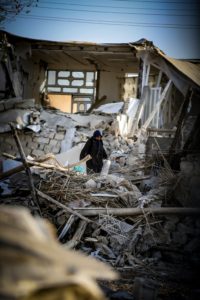Episode 12: Developing resilience following natural or human disasters
24 November 2020

In this podcast we look at how individuals and communities develop resilience.
The United Nations defines resilience as ‘the capacity of a system, community or society potentially exposed to hazards to adapt, by resisting or changing in order to reach and maintain an acceptable level of functioning and structure.’
Adapting, resisting and changing are going to be increasingly important as the current climate crisis changes our world, with an increased frequency of flash floods, famines and wildfires, and it’s imperative that we understand how we can learn from previous disasters and prepare for the future.
Joining our Director Phil Ward to discuss these issues are:
- Dr. Gina Yannitell Reinhardt, a reader in the Department of Government at the University of Essex. She studies how citizens and policy makers make decisions under uncertainty, and how those decisions affect economic, social, and political development and subsequent policy outcomes.
- Professor Roger Few, a Professorial Research Fellow in the School of International Development at the University of East Anglia. His research centres on the connections between environmental change, risk and human wellbeing, mainly in lower-income settings.
- Dr Paola Di Giuseppantonio Di Franco, a Research Fellow in the School of Philosophy and Art History at the University of Essex. She was one of the original Eastern Arc Fellows in the first phase of the consortium. Her research combines material culture, heritage, and cognitive science to explore how new technologies impact heritage making processes and the interpretation processes of the past.
- Vicky Gookool from the Open University of Mauritius, who works for the Mauritius Emergency Planning Agency. He has been closely involving in assessing processes to mitigate flash flooding and early warning systems on the island.
Photo by moein rezaalizade on Unsplash
